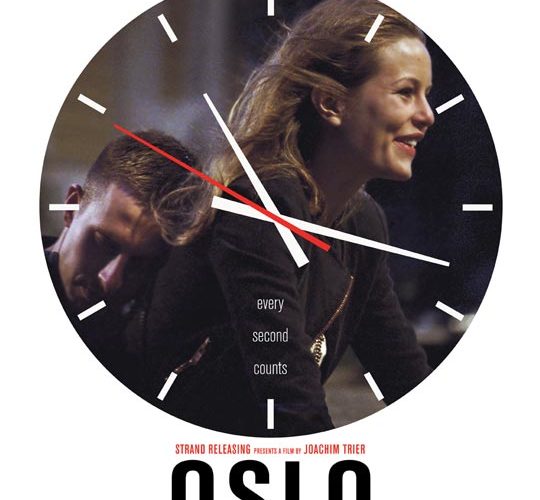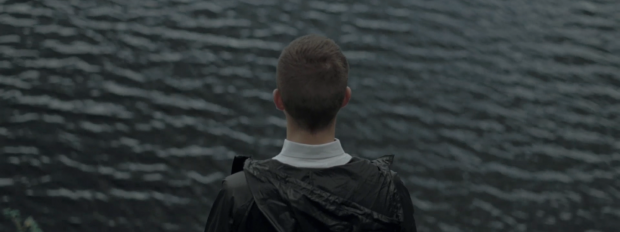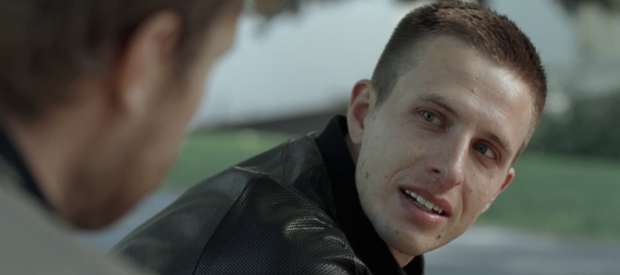Anders (Anders Danielsen Lie) marches through the forest, his famished-looking frame shrouded by the brittle branches imposing his personal space. As he approaches a river, he collects rocks — small ones here, slightly larger ones there — and stuffs them into the pockets of his black leather coat. He then lifts a bulky stone, the size of a robust baby, off the ground and carries it with him into the water. This incident occurs early on in Joachim Trier‘s Oslo, August 31st, and it speaks to this writer-director’s remarkably nimble sense of temporality that we’re not quite sure whether our beaten-down hero is going to come out from under the water.
It’s a nimbleness that was so beautifully displayed in Trier‘s altogether phenomenal first feature, Reprise, and it’s one that carries over heavily into this lyrically worthy follow-up. The specific sense of time, however, is an opposite one — if Reprise was chiefly concerned with challenging the idealized futures of its two aspiring-author lead characters, the principal focus of Oslo, August 31st is exploring Anders’s relationship with his all-too-troubled past.
The dizzying opening sequence of Reprise, which throws us one hypothetical event after another, is here responded to by a haunting voiced-over first scene that piles memory on top of memory. While the film, as its title implies, is linearly restricted to a very narrow place and time, Trier‘s curtain-raiser cues us to the fact that the film will retain a steadfast fascination with how the long-since-past affects the present — sometimes consciously, and sometimes not.
Anders is a recovering drug addict nearing the end of his institutionalized treatment, and the film concerns itself with the short leave he takes from the rehab center. His leading order of business is a job interview for a magazine — like his Reprise character, Lie is again tasked with a role brimming with literary traits — which takes an agonizing turn. Anders is also keen to revisit former friends, such as a now-married professor (Hans Olav Brenner) and a previous girlfriend he keeps calling to no avail.
There’s a third assignment on Anders’s agenda, and that’s for him to quietly reflect on himself. Trier gifts us with extended depictions of the character’s isolation, and the sense we get is that the past weeks he’s spent in rehab have been nothing more than a hazy hiatus. His long-running sobriety would be reason enough to celebrate for most junkies, but from the first moment we see Anders on the outside — looking out of a motel window in darkness, with his back to the camera — there’s the immediate implication that he’s not quite ready to confront what awaits him.
Or perhaps a more faithful description would be that he’s not quite willing to confront what lies ahead. He’s 34, jobless, unhappy, and most everything he says communicates an it’s-too-late philosophy — he probably could land the magazine gig if he wanted to, but he doesn’t, instead choosing to storm out in a fit of agitation. And when he sits alone in cafés, sipping coffee and dragging on a cigarette, everything he sees around him — smiling cliques of girls, teenagers confessing their ignorant ambitions for the future — reminds him of all that he’s lost.
These harrowing vibes are all embodied in Lie‘s performance. Unlike Reprise, he alone gets top-billing here, and he capitalizes on it with astonishing hunger and commitment. He gives even the most inconsequential events a feeling of mounting strain and uneasiness. Even when, at a party, he finally catches the attention of the girl he’s had his eyes on all night, we know instantly that it’s not enough. The strobe-lit chaos of the nightclub may be enough to blind her from Anders’ anxiety, but it never has the equivalent effect on the viewer. Assuredly, the film keeps us constantly on our toes, wondering which trigger — if any — will send Anders over the deep end.
With Reprise and Oslo, August 31st — which, in the ways explained, can very much be seen as companion pieces — Trier has set the framework for an enormously promising career. The way he sheds the barriers of time — transcending them with a poetic harmony — is unique and always bursting with emotion. The conclusion of this film is both too neat and inevitably spot-on, and it deserves further assessment with subsequent viewings. But the first-glance impact is nothing less than powerful, punctuated by a confidently observant camera that captures each puff of Anders’ cigarettes, and each reflective gaze of his weakened, hollowed-out face.
Oslo, August 31st is now in limited release.



